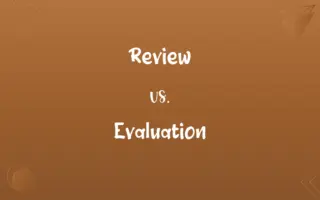Aphasia vs. Dysphasia: Know the Difference

By Shumaila Saeed || Updated on December 25, 2023
Aphasia is a language disorder caused by brain damage leading to impaired language abilities, while dysphasia is a milder form of aphasia with partial impairment of language comprehension or production.

Key Differences
Aphasia is a condition resulting from significant brain damage, often due to stroke or head injury, leading to a substantial loss of the ability to understand or express language. Dysphasia, on the other hand, implies a lesser degree of impairment, where individuals have difficulty with language comprehension or expression, but not complete loss.
Shumaila Saeed
Nov 15, 2023
In aphasia, individuals might experience a near-total inability to speak, understand, read, or write in severe cases. With dysphasia, individuals typically retain some language function, but struggle with certain aspects of communication, like finding the right words or understanding complex sentences.
Shumaila Saeed
Nov 15, 2023
Aphasia often results from more extensive brain damage and is usually more noticeable and debilitating in its impact on daily communication. Dysphasia often indicates a less severe or more localized brain injury, allowing for more functional communication, albeit with difficulties.
Shumaila Saeed
Nov 15, 2023
The recovery process for aphasia can be lengthy and challenging, often requiring extensive speech and language therapy. Recovery from dysphasia might be quicker or more complete, as the language impairment is less severe from the outset.
Shumaila Saeed
Nov 15, 2023
Aphasia encompasses different types, such as Broca's aphasia and Wernicke's aphasia, each with specific symptom profiles. Dysphasia may also present in various forms but generally involves a milder manifestation of similar symptoms.
Shumaila Saeed
Nov 15, 2023
ADVERTISEMENT
Comparison Chart
Severity
Severe impairment or loss of language abilities
Milder impairment of language abilities
Shumaila Saeed
Nov 15, 2023
Communication Impact
Often substantial, affecting all language modalities
Less extensive, with difficulties in certain aspects
Shumaila Saeed
Nov 15, 2023
Cause
Typically due to extensive brain damage
Often due to less severe or localized brain injury
Shumaila Saeed
Nov 15, 2023
Recovery Potential
Recovery can be more challenging
Often quicker or more complete recovery
Shumaila Saeed
Nov 15, 2023
Types
Includes Broca's, Wernicke's, and Global Aphasia
Variants may mirror aphasia types but less severe
Shumaila Saeed
Nov 15, 2023
ADVERTISEMENT
Aphasia and Dysphasia Definitions
Aphasia
Aphasia often results from a stroke or traumatic brain injury.
The car accident caused a traumatic brain injury that led to aphasia.
Shumaila Saeed
Nov 15, 2023
Dysphasia
Dysphasia can be a temporary condition following brain injury.
His dysphasia improved significantly with speech therapy after the injury.
Shumaila Saeed
Nov 15, 2023
Aphasia
Aphasia is a language disorder caused by brain damage that affects speaking, understanding, reading, and writing.
After the stroke, he was diagnosed with aphasia, making communication difficult.
Shumaila Saeed
Nov 15, 2023
Dysphasia
Dysphasia affects communication ability but varies in severity.
Even with dysphasia, she can communicate her basic needs effectively.
Shumaila Saeed
Nov 15, 2023
Aphasia
Aphasia involves both the expressive and receptive aspects of language.
Due to aphasia, he struggles to form coherent sentences and understand others.
Shumaila Saeed
Nov 15, 2023
ADVERTISEMENT
Dysphasia
Dysphasia is a milder form of language impairment affecting comprehension or production.
She has dysphasia, so she sometimes finds it hard to find the right words.
Shumaila Saeed
Nov 15, 2023
Aphasia
Aphasia can manifest in different forms, such as Broca's or Wernicke's aphasia.
Her aphasia was categorized as Broca's, affecting her speech production.
Shumaila Saeed
Nov 15, 2023
Dysphasia
Dysphasia often involves struggling with complex language tasks.
Complex conversations can be challenging for someone with dysphasia.
Shumaila Saeed
Nov 15, 2023
Aphasia
Aphasia is characterized by difficulty in communication, not intelligence or cognitive function.
Despite his aphasia, he remains intellectually sharp and aware.
Shumaila Saeed
Nov 15, 2023
Dysphasia
Dysphasia is sometimes used interchangeably with aphasia, but generally indicates a lesser degree of impairment.
After the mild stroke, he experienced dysphasia, but it was not as severe as aphasia.
Shumaila Saeed
Nov 15, 2023
Aphasia
Partial or total loss of the ability to articulate ideas or comprehend spoken or written language, resulting from damage to the brain from injury or disease.
Shumaila Saeed
Oct 19, 2023
Dysphasia
Impairment of speech and verbal comprehension, especially when associated with brain injury.
Shumaila Saeed
Oct 19, 2023
Aphasia
(pathology) A partial or total loss of language skills due to brain damage. Usually, damage to the left perisylvian region, including Broca's area and Wernicke's area, causes aphasia.
Shumaila Saeed
Oct 19, 2023
Dysphasia
(pathology) Loss of or deficiency in the power to use or understand language as a result of injury or disease of the brain.
Shumaila Saeed
Oct 19, 2023
Aphasia
Loss of the power of speech, or of the appropriate use of words, the vocal organs remaining intact, and the intelligence being preserved. It is dependent on injury or disease of the brain.
Shumaila Saeed
Oct 19, 2023
Aphasia
Inability to use or understand language (spoken or written) because of a brain lesion
Shumaila Saeed
Oct 19, 2023
Repeatedly Asked Queries
Can dysphasia occur in children?
Yes, dysphasia can occur in children, often due to developmental issues or injury.
Shumaila Saeed
Nov 15, 2023
Is aphasia a form of dementia?
No, aphasia is a language disorder, not a form of dementia.
Shumaila Saeed
Nov 15, 2023
Are aphasia and dysphasia permanent?
The permanence varies; some people recover completely, while others have long-term effects.
Shumaila Saeed
Nov 15, 2023
What causes dysphasia?
Dysphasia can be caused by less severe brain injuries or conditions affecting language areas.
Shumaila Saeed
Nov 15, 2023
What causes aphasia?
Aphasia is typically caused by brain damage from stroke, injury, or disease.
Shumaila Saeed
Nov 15, 2023
Can aphasia affect a person's ability to swallow?
Aphasia itself does not affect swallowing, but associated conditions might.
Shumaila Saeed
Nov 15, 2023
Does dysphasia affect cognitive abilities?
Dysphasia primarily affects language abilities, not overall cognitive function.
Shumaila Saeed
Nov 15, 2023
How is dysphasia diagnosed?
Dysphasia is diagnosed through speech and language evaluations.
Shumaila Saeed
Nov 15, 2023
Can aphasia affect reading and writing?
Yes, aphasia can impact reading and writing abilities.
Shumaila Saeed
Nov 15, 2023
Can someone with aphasia understand others?
This varies; some with aphasia have difficulty understanding language.
Shumaila Saeed
Nov 15, 2023
Is there a cure for dysphasia?
There's no definitive cure, but speech therapy can significantly improve symptoms.
Shumaila Saeed
Nov 15, 2023
How is aphasia diagnosed?
Aphasia is diagnosed through language assessments by healthcare professionals.
Shumaila Saeed
Nov 15, 2023
What role does a speech therapist play in treating dysphasia?
A speech therapist helps improve language abilities and develop alternative communication strategies.
Shumaila Saeed
Nov 15, 2023
Are there support groups for people with dysphasia?
Yes, there are support groups for individuals with dysphasia and their families.
Shumaila Saeed
Nov 15, 2023
Can aphasia lead to social isolation?
Yes, the communication barriers from aphasia can lead to social isolation, requiring support and understanding from family and friends.
Shumaila Saeed
Nov 15, 2023
How can family members help someone with aphasia?
Through supportive communication strategies and engaging in speech therapy practices.
Shumaila Saeed
Nov 15, 2023
Can technology aid in the treatment of aphasia?
Yes, certain apps and devices are designed to assist with communication in aphasia.
Shumaila Saeed
Nov 15, 2023
Are there different types of aphasia?
Yes, including Broca's, Wernicke's, and Global Aphasia.
Shumaila Saeed
Nov 15, 2023
What is the difference between dysphasia and speech disorders?
Dysphasia is a language disorder, while speech disorders specifically affect the physical act of speaking.
Shumaila Saeed
Nov 15, 2023
Is dysphasia a symptom of stroke?
Dysphasia can be a symptom of a stroke, especially if the language areas of the brain are affected.
Shumaila Saeed
Nov 15, 2023
Share this page
Link for your blog / website
HTML
Link to share via messenger
About Author
Written by
Shumaila SaeedShumaila Saeed, an expert content creator with 6 years of experience, specializes in distilling complex topics into easily digestible comparisons, shining a light on the nuances that both inform and educate readers with clarity and accuracy.






































































